- Home
- Jim Eldridge
Blood On the Wall Page 2
Blood On the Wall Read online
Page 2
Parks heard the sound of running footsteps, turned and saw Georgiou heading for him, and immediately let go of the woman’s bag and ran for it. Taggart appeared in the car, the driver’s window rolled down, and Georgiou pointed at the fallen woman and shouted ‘Look after her!’ as he ran off in pursuit of Parks.
Parks may have been younger than Georgiou, but his lifestyle meant he wasn’t as fit, and Georgiou was soon catching up with him. Parks suddenly stopped and whirled round, pulling a screwdriver out of his pocket as he did so, and holding it menacingly towards Georgiou.
‘Back off!’ yelled Parks. He looked panicky.
Georgiou took a step forward, and Parks thrust at him with the screwdriver. Georgiou swayed aside from it and caught Parks’s wrist, twisted it, and then punched Parks hard in the face with his other fist.
Parks staggered, and then Georgiou twisted his arm, forcing him down onto his knees, his face close to the pavement. Blood dripped from Parks’s nose and he dropped the screwdriver.
‘I am arresting you for assault with intent to commit a theft,’ said Georgiou. ‘You have the right to remain silent, but anything you do say will be taken down and may be used in evidence.’
With that Georgiou jerked Parks back to his feet, and then handcuffed him.
‘I didn’t do nuffin’!’ protested Parks.
‘In that case you’ve got nothing to worry about,’ grunted Georgiou. He used his handkerchief to pick the screwdriver up from the ground, put it in his pocket, and then hauled Parks in the direction of the car.
Within minutes word of the arrest had spread around the estate, and within an hour Parks’s father had put in an appearance at the police station, demanding to see his son. Georgiou had dealt with Mr Parks himself, and had found him to be a loud-mouthed, blustering bully who had tried to shout Georgiou into releasing Ian Parks. Georgiou refused, advising Mr Parks that Ian Parks was under arrest.
Two hours later Mr Parks returned, this time accompanied by Councillor John Maitland, who demanded to know what was going on. Georgiou told Maitland that a case was under investigation and a report would be issued in due time.
An hour later, as Georgiou was signing off and about to go home, a solicitor appeared who said he had been ordered to act for Ian Parks and demanded that he see his client. Georgiou assumed that the solicitor had been brought in by Maitland.
The solicitor spent time with Ian Parks, and then left.
Parks was held overnight in the cells, and when he appeared in the magistrates court the next day, the solicitor turned the whole event round: his client, he claimed, had been offering to help Mrs Izmir, the old lady, with her shopping, when a man had appeared who seemed very threatening. Because there had been a lot of muggings on the estate recently, Ian Parks assumed the man was a mugger who was intending to rob him, and so Parks ran away. The man chased after him. At no time did the man identify himself as a police officer. The man caught him and then assaulted him very badly. The solicitor said he would be producing a statement from the old lady concerned to confirm that the young lad had offered to help her with her shopping, and that she had been shocked when the man had run towards them. The solicitor suggested that the whole case be dropped, but the Crown Prosecution Service, acting on the advice of the police, said they intended to proceed with the case against Ian Parks. The solicitor asked for bail for his client while the defence was prepared. Bail was granted and Parks was released.
Later, Mrs Izmir had been brought to the station by Mr Parks to make a statement confirming that Ian had offered to carry her shopping on the occasion in question, and that she had not been mugged. According to the desk sergeant who met them when they came in, and DC Debby Seward who had taken Mrs Izmir’s statement, the old lady looked terrified. There was no doubt at all in Georgiou’s mind that she had been threatened by Parks.
However, Georgiou had what he believed was an ace up his sleeve: the statement that Mrs Izmir had made to Kirsty Taggart immediately after the assault. It was one of the things that Georgiou insisted on with his team: ‘Get a statement immediately before they have time to forget things or make things up. Get it while things are still fresh in their mind.’
So Kirsty Taggart had got a signed statement from Mrs Izmir stating that Ian Parks had tried to pull her handbag from her, and in doing it had pulled her over so that she fell to the ground. Parks had then run off when a man ran towards them.
It should have been enough to settle the case, but it wasn’t. The Parks family and Councillor Maitland had taken the story to the local press, accusing Georgiou of police brutality on an innocent boy, and of putting pressure on the witness to make a false statement. The fact that Maitland was on the Police Authority gave him more clout, and he used it. Before Georgiou knew what was happening, Maitland had tabled a motion for the Police Authority asking that Georgiou be suspended until a full investigation of the events had been carried out.
Georgiou and his team thought the motion would be easily dismissed. After all, he had Mrs Izmir’s statement. But he had no witnesses to back him up. Kirsty Taggart had stayed with Mrs Izmir to help her recover and take her statement. However, there were witnesses who had seen Georgiou grab Parks by the arm, punch him, and force him to the ground. None of them mentioned anything about seeing Parks holding a screwdriver. Parks claimed it had fallen from his pocket when Georgiou forced him to the ground. The reason he had a screwdriver in his pocket, he said, was because he had been fixing an electrical socket at home and had put the screwdriver there afterwards, a story backed up by his parents.
The result was that the Police Authority had voted by seven to five to suspend Georgiou from duty while an investigation was carried out. And rumour said that Maitland was already hard at work trying to drum up evidence of other examples of Georgiou being heavy-handed with suspects. And if not Georgiou, then any officer on the force. If Maitland could prove there was a culture of police brutality in the Cumbrian police, then Georgiou would be the scapegoat. And Georgiou knew there would be examples unearthed: drunks arrested with a slight excess of zeal on a Friday night; drug dealers and muggers banged against a wall maybe a little too hard. But one thing was for sure: Georgiou wasn’t going to go down without a fight. He’d show the Parks family and Councillor bloody Maitland what they were up against.
The phone ringing brought him out of his reverie.
‘Georgiou,’ he said.
It was Armstrong.
‘The suspension’s lifted. You’re back on the job.’
FOUR
Georgiou drove from Bowness towards Carlisle along the coast road that ran alongside the Solway Firth. Colleagues in Carlisle asked him why on earth he lived out in such a remote place. ‘It’s the end of the earth,’ they said. ‘There’s a pub and that’s all. Nothing is out there. No takeaways, no chippy. You ought to be in Carlisle where things are happening.’
You’re wrong, he thought. Bowness is where things are happening: real things. The magnificent sight of the thousands and thousands of geese that flew along the Solway at the start of every October, come from the Arctic to spend the winter on the Solway marshes. The herons. The wild swans. Oystercatchers, curlews.
Five years ago, in London, he’d been barely able to tell a pigeon from a crow. Now he could identify a bird from a distance by the way it moved in the air, from its silhouette as it waded on the mudflats.
The sun was hot through the car windows, and he opened them wide. Summer had started. He drove across the expanse of marsh, past the signs that said ‘Road liable to tidal flooding. When water reaches this point it is two feet deep’. At least twice a year the road between Carlisle and Bowness flooded, the sea pouring across the marsh and over the road like a causeway. His colleagues in Carlisle said they wouldn’t be able to cope with it. It was another aspect of living out on the peninsula that Georgiou loved, the fact that the forces of nature were always present: flood and storm striking at will. You learned to live with it, and respect it.
It had been Susannah who had first suggested they move here. They were both worried about what was happening in London: murder rates rising, violent crime, robbery. They agreed it was no place to raise children, and they both wanted children. They had decided on two: one boy and one girl. Or two boys or two girls. It didn’t matter. They just felt that they didn’t want their child to be an only child. Georgiou and Susannah had both been only children, and both felt they’d missed out growing up. A child needed a brother or sister as a friend, as a companion, or as someone else in the family to annoy.
Susannah had suggested Cumbria. She said it was far away from everywhere, especially dangerous cities. Georgiou checked the crime statistics: according to them it appeared to be one of the safest places in Britain.
Prices of property in the Lake District and south Cumbria came as a shock to both of them. The influx of southerners buying up properties as second homes or ‘investment opportunities’ pushed prices sky-high, so they looked further afield.
They found a house they could afford in Bowness on Solway, a small village of some 250 people on the Solway coast, fourteen miles west of Carlisle. The house was one in a small terrace: three decent-sized bedrooms, a living room and a kitchen, plus a tiny room that would serve as a study for Georgiou. There was also a garden at the back that looked out across the Solway Firth to Eastriggs in Scotland.
During the time they searched for their new home, Georgiou had applied for a transfer to the Cumbria force, and luckily for him, it coincided with the Home Office looking at Cumbria and deciding that the Cumbrian police force did not have enough officers from ‘minority or ethnic communities’.
Georgiou had built up a good reputation as an efficient detective during his time with the Met, but he was sure it was the ‘ethnic’ tag that had landed him the job with the Carlisle force. He may have sounded English, but his type of spoken English was London, which was virtually a foreign language to most Cumbrians. And there was his name: Andreas Georgiou. Greek. Ethnic. A minority nationality, especially in Cumbria. Georgiou got the transfer, and the promotion to detective inspector, and he and Susannah moved to their new home.
Susannah got herself a job in a solicitor’s office in Carlisle. It was a stopgap while they waited for their first baby to come along. A year after they arrived in Bowness, Susannah gave birth. Or, rather, almost gave birth. The baby was stillborn. It was a boy. They’d given him a name: Paul.
Then came the bad news. Susannah was ill. Very ill. Cancer. They didn’t know where it had come from, what had caused it … but then they had to admit that they didn’t know a great deal about the causes of cancer. All they did know was that it had got into her lymph system and was now attacking her liver, as well as most of her other organs.
Four months later, Susannah was dead.
In the three months after her death, Georgiou worked all the hours he could, taking all the spare shifts there were, just to keep him from being alone in the house. He considered selling up and moving. But where to? In his heart he felt that Susannah was still here, still with him at Bowness. He couldn’t leave because to leave would be leaving her.
And so he stayed.
As his car bumped over the cattle grid that signified the end of the marsh and the entry into Burgh by Sands, and the road away from the coast to Carlisle, he knew that Susannah was with him. That she always would be.
The drive from Burgh into the outskirts of Carlisle was mercifully free of traffic. Now and then a tractor came out of one of the farms and trundled along at twenty-five miles an hour before turning into a field, forcing Georgiou to stay behind it at low speed because the road twisted and turned with many blind bends; too dangerous to try overtaking. And once he had to slow down for a pack of cyclists bent low over their handlebars. On the back of the rear bicycle a battered placard fluttered which read: ‘We’re cycling the wall.’
At this time of year, summer, the road between Bowness and Carlisle was packed with people walking Hadrian’s Wall. They came in all shapes and sizes, and all sorts of costumes. Once he had even seen a group of Roman soldiers in full kit, complete with heavy metal helmets and swords, and the legion’s eagle on a pole, marching steadfastly across the marsh. Most of those who did the wall on foot came off at Burgh by Sands and continued their marathon along the specially made Hadrian’s Wall Trail, a gravel footpath some of the way, and tracks across fields elsewhere. But the cyclists stayed on the road. And not all of them were on modern bikes. Georgiou had seen five huge penny-farthings wobbling along precariously. All for charity, of course. But at what cost? Blisters on the feet. Sore shoulders from the rucksacks. And if anyone had fallen off one of those penny-farthing bicycles, it would have meant a few weeks in hospital. Still, they were all having fun in their own way. Georgiou just wished they wouldn’t do it where he lived.
Georgiou’s quiet drive ended when he turned off Burgh Road into Carlisle’s Newtown Road. A long line of traffic was backed up along the road. He cursed as he remembered that roadworks were happening in Newtown Road this week. Water pipes being renewed or something. If it wasn’t that, it was the electricity cables. Or any of a dozen reasons why the road was being dug up yet again. The heat of the sun in the car, warm in the countryside, was suddenly stifling here in the city, even on the outskirts.
He calmed himself down and turned on the radio, tuning in to BBC Radio Cumbria just as the traffic report came on. The cheerful-voiced girl confirmed that there were indeed roadworks in Newtown and Port Roads and delays should be expected. There were also delays on the M6 due to roadworks, on the A595 due to an accident, and on the trains due to a signal failure.
‘The whole country’s grinding into gridlock,’ grunted Georgiou to himself sourly. But at least it wasn’t as bad here in north Cumbria as it was in, say, London and the southeast. There, some commuters spent six hours a day stuck in traffic or on overcrowded trains getting to and from work. A nightmare, by any standards.
Finally, after what seemed like an eternity, but was actually only fifteen minutes, Georgiou made it past the Cumberland Infirmary, and out of Port Road at the McVities’ roundabout and onto Bridge Street and Castle Way, the dual carriageway.
Georgiou managed to find a parking space outside the large circular tower known as the Courts, the temporary home for the Carlisle police force following the severe floods, at the bottom of English Street. With their official HQ out of action the police had been moved into this old building as a ‘temporary measure’, while the flood damage in their old HQ was being repaired. More than three years on and they were still in the ancient building. Among the officers they were running a book on how long it would be before they could move back. Georgiou had bet it would take two years. He’d lost his bet already.
As Georgiou walked into police HQ, the first person he met was the duty desk sergeant, Andy Graham.
‘Morning, Inspector,’ said Graham, beaming. ‘Heard you were coming back. Great news!’
‘Thanks.’ Georgiou nodded
‘Double whammy for you, in a manner of speaking, eh?’ continued Graham, still smiling.
Georgiou looked at him, puzzled.
‘The football,’ said Graham. ‘Last night.’
Inwardly, Georgiou groaned. He’d watched the match on TV. England versus Greece. It had been a dreadful game, ending in a 0-0 draw. Not worth watching.
‘Nil-nil,’ laughed Graham. ‘I mean, against England, that’s the equivalent of a win for you Greeks.’
Georgiou wanted to say: I’m not Greek, I’m English. But it would be a waste of breath. Georgiou reflected that other people had always suffered like this. Someone with an Irish surname like Murphy or O’Connell was always going to be called Paddy, even if they’d had no Irish antecedents for generations. Somewhere back there in the mists of time was Irishness, so convention said that person would be fond of Guinness and have a touch of the Blarney about them.
‘I’ve got one thing to say to you, Sergeant,’ said Georgiou with a sly smile.
‘Euro 2004.’
Sergeant Graham shifted uncomfortably. The sergeant was a deeply patriotic football fan, and wasn’t fond of being reminded of key defeats inflicted on his beloved England football team, nor of being reminded that rank outsiders Greece had won the 2004 Euro tournament.
‘Boss!’
The sound of the cheerful voice made Georgiou turn. His DS, Mac Tennyson, was heading towards him along the high-ceilinged corridor, a broad beam on his face and one hand outstretched in greeting. In his other hand was a half-eaten Mars Bar. Tennyson liked sweets and beer, and it showed in the stomach pushing at his lower shirt buttons.
Georgiou took Tennyson’s hand and shook it firmly.
‘That’s got to be the shortest suspension on record, boss!’ laughed Tennyson happily.
‘No bribes changed hands, I can assure you,’ said Georgiou.
Tennyson gestured towards the stairs.
‘Superintendent Stokes left a message that he wants to see you before you start,’ he said.
‘To congratulate me, I suppose,’ commented Georgiou wryly.
Georgiou had little time for Stokes. As far as Georgiou was concerned, the superintendent was a career politician posing as a policeman. Shaking all the right hands, preferably with a Masonic flourish. Smiling at all the right people. Appearing at all the right gala evenings and celebratory dinners. Playing golf with the right contacts. And, most of all, desperate not to make any waves that might upset The Authorities. Catch lots of speeding motorists to keep the statistics of ‘crimes solved’ sweet, and make sure the paperwork was in order.
‘Where are the rest of the team?’ asked Georgiou.
‘Out checking evidence and taking witness statements,’ replied Tennyson.
‘Anything from the path lab on the body?’ asked Georgiou.
Tennyson shook his head. ‘I was just going over there to get the report,’ he said.

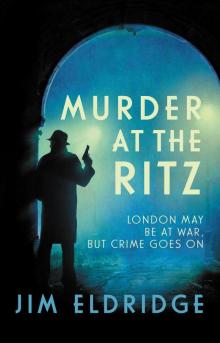 Murder at the Ritz
Murder at the Ritz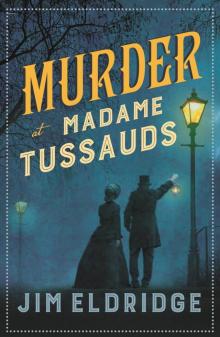 Murder at Madame Tussauds
Murder at Madame Tussauds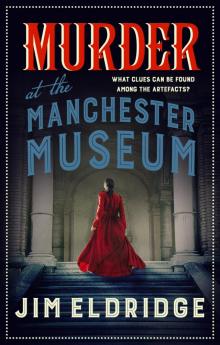 Murder at the Manchester Museum
Murder at the Manchester Museum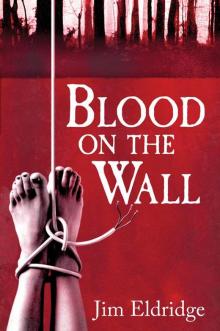 Blood On the Wall
Blood On the Wall 4.3.2.1
4.3.2.1 Jungle Kill (Black Ops)
Jungle Kill (Black Ops)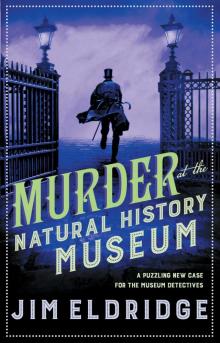 Murder at the Natural History Museum
Murder at the Natural History Museum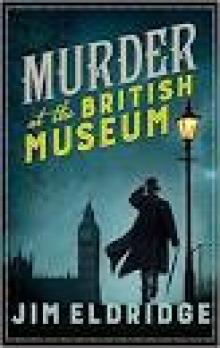 Murder at the British Museum
Murder at the British Museum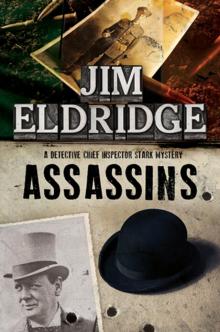 Assassins
Assassins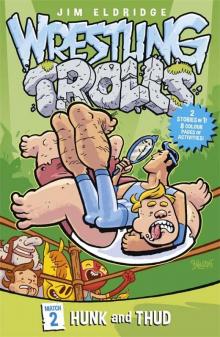 Hunk and Thud
Hunk and Thud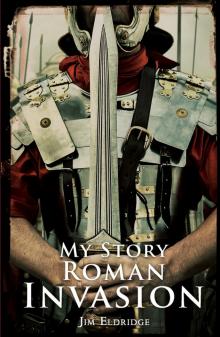 Roman Invasion
Roman Invasion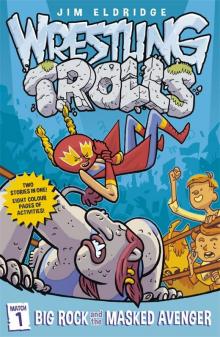 Big Rock and the Masked Avenger
Big Rock and the Masked Avenger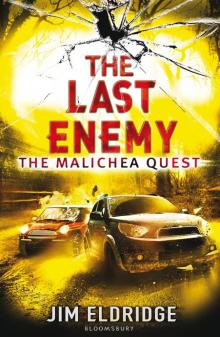 The Last Enemy
The Last Enemy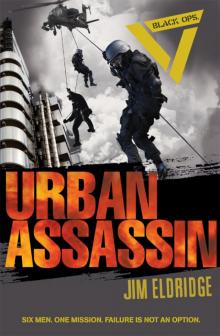 Urban Assassin
Urban Assassin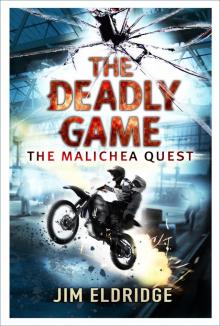 The Deadly Game
The Deadly Game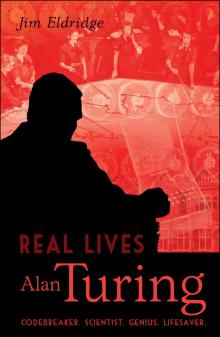 Alan Turing
Alan Turing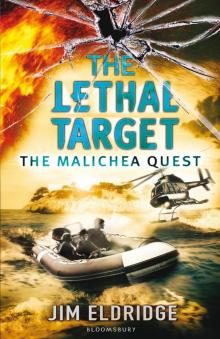 The Lethal Target
The Lethal Target The Giant Rumble
The Giant Rumble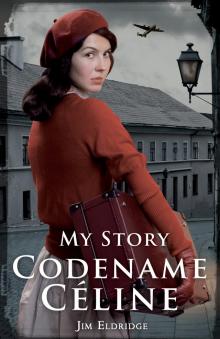 Codename Céline
Codename Céline Death in the Desert
Death in the Desert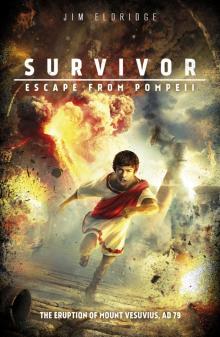 Escape from Pompeii
Escape from Pompeii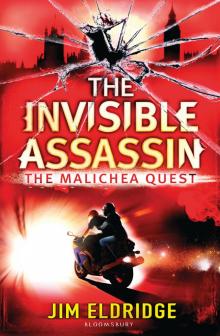 The Invisible Assassin
The Invisible Assassin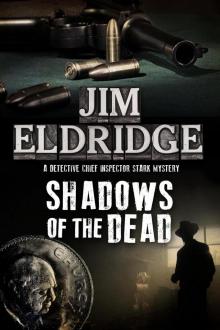 Shadows of the Dead
Shadows of the Dead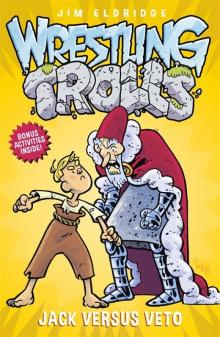 Jack Versus Veto
Jack Versus Veto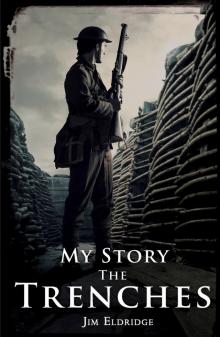 The Trenches
The Trenches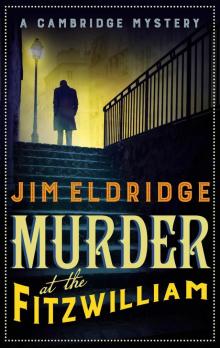 Murder at the Fitzwilliam
Murder at the Fitzwilliam Coming Home
Coming Home